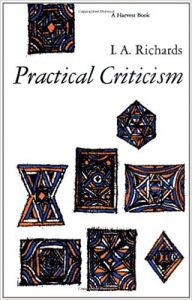By Mena McCarthy
New and Practical criticisms are both very formalist schools of theory, where literature is either canon or non-canon. Lehman College’s ENG 463: Seminar in Literature: Theory & Criticism class sought to prove that as Honors English major students we can prove that our training in literature can allow us to discern between the two types of literature if given no outside context for the piece of text in front of us. But first, to explain the differences between New Criticism and Practical criticism, and our literary experiment!
New Criticism is reminiscent of a factory, where literature is filed through different compartments and areas until it can fall into the final category of “canon” or “non-canon” literature. Critics in this school of theory, such as Cleanth Brooks, believe that text, or in his case poetry, is a “well-wrought urn,” a combination of visual appeal and functionality. In terms of poetry, Brooks focuses on the “truths,” “structure of meaning,” and the “heresy of paraphrase” that separates canonical text from non-canonical text. His book The Well-Wrought Urn contains a chapter called “The Heresy of Paraphrase,” which explains that in order for a text to be considered true literature, words cannot be paraphrased because it would completely eschew the meaning of the text. He states:
If we allow ourselves to be misled by it, we distort the relation of the poem to its “truth,” we raise the problem of belief in a vicious and crippling form, we split the poem between its “form” and “content”—we bring the statement to be conveyed into an unreal competition with science or philosophy or theology…If we allow ourselves to be misled by the heresy of paraphrase, we run the risk of doing even more violence to the internal order of the poem itself. By taking the paraphrase as our point of stance, we misconceive the function of metaphor and meter. We demand logical coherences on levels where they are highly relevant.
Brooks brings up an interesting point; by separating the form and content of the poem we are doing the text itself a great injustice. The words that are on the physical page are carefully chosen by the author to have a certain meaning or to portray a certain message. In changing that, we take away that central message and render the text nearly useless. Overall, the heresy of paraphrasing possibly canonical text leaves it unique, unchanging, and still on its canonical pedestal.

This closely relates to I.A. Richards’ school of Practical Criticism, that also categorizes literature into canon and non-canon. Practical Criticism essentially states that, to the trained eye, one should be able to discern between canon and non-canon literature solely based on the piece of text, without any authorial information or other kinds of background information. He ran an experiment at Cambridge University on his students where he did just that, and they all failed miserably. Richards extrapolated that even the most highly trained people in the literary field would have failed the same, not being able to discern true canonical literature from drivel.

The ENG 463 class of the Spring 2017 semester at Lehman College sought to test this literary theory and see how accurately we could discern between what we’ve been taught as “canon literature” for us English majors, and non-canonical literature. We drew slips of paper from a hat and were told to bring in a paragraph of our respective choice. The next class we all put our unlabeled paragraphs and enumerated them, writing “canon” or “non-canon” next to the numbers in our notebooks. After reviewing our answers, we found that we were very competent in discerning between the two, with all of the scores being above a 7/10 for the pieces of text brought in (and not including the piece we brought in ourselves). It was interesting that Richards seemed to give up on his results so quickly, and it is curious to see whether the results of either people from other college majors or even people within the English major at Lehman College would be able to differentiate between the two. At the end of this article there is a link to a quiz so you can test yourself ! Enjoy and good luck!
Mena McCarthy
Macaulay Honors College at Lehman College
Honors English Literature / Pre-Vet track
https://www.proprofs.com/quiz-school/story.php?title=mtkwndqymqg66r

